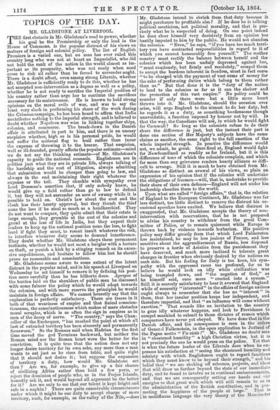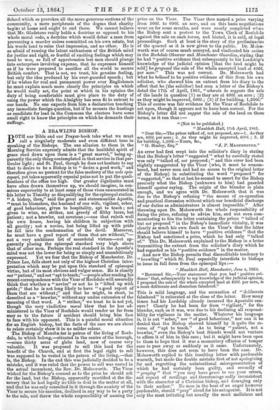TOPICS OF THE DAY.
MR. GLADSTONE AT LIVERPOOL. THE first obstacle in Mr. Gladstone's road to power, whether his goal be the Premiership or only the lead in the House of Commons, is the popular distrust of his views on matters of foreign and colonial policy. The list of English Premiers is a varied one, but no man has ever ruled this country long who was not at heart an Imperialist, who did not hold the rank of the nation in the world almost as im- portant as its prosperity, who was not ready when need arose to risk all rather than be forced to surrender aught. There is a doubt afloat, even among strong Liberals, whether Mr. Gladstone is sufficiently ready to do this, whether he has not accepted non-intervention as a dogma as well as a policy, whether he is not ready to sacrifice the Imperial position of his country rather than urge her to continue the sacrifices necessary for its maintenance. He is known to hold strong opinions on the moral evils of war, and was to say the least very slack in performing his share of the work during the Crimean campaign, he has been heard to affirm that India contributes nothing to the imperial strength, and is believed to doubt whether Napoleon was wise in linking together ships, colonies, and commerce. The break-down in the Danish affair is attributed in part to him, and there is an uneasy suspicion whether, high as is his personal pride, he would not suffer the national flag to trail rather than incur the expense of throwing it to the breeze. That suspicion, well or ill-founded, greatly affects the popular estimate—mind we do not say the thinking estimate—of Mr. Gladstone's capacity to guide the national counsels. Englishmen are in politics just what they are in private life, always talking of the hardship and the cost of litigation, always admitting that submission would be cheaper than going to law, and always in the end maintaining their right whatever the expense or the toil. They chuckle with sympathy over Lord Denman's assertion that, if only nobody knew, he would give up a field rather than go to law to defend it, but they will not surrender an acre of swamp while it is possible to hold on. Christ's law about the coat and the cloak has their hearty approval, but they thrash the thief none the less if he steal so much as a handkerchief. They do not want to conquer, they quite admit that their estate is large enough, they grumble at the cost of the colonies and growl at the loss of life in India, but they expect their leaders to keep up the national position none the less, to fight hard if fight they must, to resent insult whatever the risk, to interfere whenever duty seems to demand interference.
They doubt whether Mr. Gladstone obeys these permanent instincts, whether he would not meet a burglar with a lecture on theft, or punish a kick by a stinging remark on its exces- sive unpoliteness, and hesitate to follow him lest he should prove too reasonable and conscientious. Mr. Gladstone seems aware to some extent of the latent distrust in the popular mind, and in his speech at Liverpool on Wednesday he set himself to remove it by defining his posi- tion more carefully than he has hitherto done. Apropos of the burden laid on the shoulders of public men he discussed with some fulness the policy which he would adopt towards the colonies, and with more reserve the principles he would maintain in foreign affairs. We cannot honestly say that the explanation is perfectly satisfactory. There are traces in it both of that weariness of empire and that finical conscien- tiousness, the conscientiousness which makes of mere obstacles moral scruples, which is so often the sign in empires as in men of the decay of nerve. " The country," says the Chan- cellor of the Exchequer, " has reached the point at which all lust of extended territory has been sincerely and permanently foresworn." So the Romans said when Hadrian for the first time moved the god Terminus backward, but neither the Roman mind nor the Roman heart were the better for the conviction. It is quite true that the nation does not any longer desire territory for its own sake, any more than a man wants to eat just as he rises from table, and quite right that it should not desire it; but suppose the expansion of territory a duty, how would Mr. Gladstone act then ? Are we, for example, to give up a fair chance of civilizing Africa rather than hold a few ports, or reject the dominion of people who, as in the Feejee Islands, honestly ask it, and would beyond all argument be the better for it ? Are we only to see that our talent is kept bright and safe in a napkin ? There are quite conceivable circumstances under which it might be our duty to accept charge of more territory, such, for example, as the valley of the Nile,—does Mr. Gladstone intend to shrink from that duty because it might perchance be profitable also ? If he does he is talking political asceticism, not political morality, and that is pre- cisely what he is suspected of doing. On one point indeed lie does clear himself very decisively from an opinion too hastily imputed to him by the public. He would not abandon the colonies. "Even," he says, "if you have too much terri- tory you have contracted responsibilities in regard to it of which you cannot honourably free yourself." The mother country must rectify the balance between herself and the colonies which has been unduly depressed against her, " must cautiously, but firmly and resolutely," compel them to accept the burdens inherent in freedom, must in fact cease "to be charged with the payment of vast sums of money for the sake of performing duties which belong to them rather than us." But that done it is the "duty of the nation to lend to the colonies as far as it can the shelter and the protection of this vast empire." No policy could be sounder if only there were but a little more heart thrown into it. Mr. Gladstone, should the occasion ever arise, will urge England to the utmost to do her duty, but he regards it as a duty, as something burdensome though unavoidable, a function imposed by honour not by will. Is that the way, the Canadians will ask, in which he would fight for Cornwall: So long as the colonists refuse to do their share the difference is just, but the instant their part is done one section of Her Majesty's subjects have the same claims as another, the same right to the full exertion of the whole imperial strength. In practice the difference would not, we admit, be great. Once fired at, England would fight for Newfoundland as readily as for Ireland, but it is this difference of tone of which the colonists complain, and which far more than any grievance renders hearty alliance so diffi- cult to arrange. Still it is much to have obtained from Mr. Gladstone so distinct an avowal of his views, so plain an expression of his opinion that if the colonies will undertake the obligations of freemen—will, that is, undertake to provide their share of their own defence—England will not under his leadership abandon them to the world.
Upon what are called " foreign affairs," that is, the relation of England to the European Continent, Mr. Gladstone was far less distinct, too little distinct to remove the distrust his oc- casional speeches have excited. We believe that distrust is exaggerated, that Mr. Gladstone accepts the theory of non- intervention with reservations, that he is not prepared to advise his country to withdraw from the great Com- mittee of Police, or to remain quiescent while Europe is thrown back by violence towards barbarism. His positive policy may differ greatly from that which Lord Palmerston, has maintained, he may be less jealous of France, and less sensitive about the aggrandizement of Russia, less disposed to preserve a horde of Asiatics from the punishment they have deserved, and much more inclined to tolerate great changes in frontier when obviously desired by the nations on each side. But his feeling for Italy is too keen, his sym- pathy with the oppressed races too profound, for us to believe he would look on idly while civilization was being trampled down, and " the negation of God," as he himself said, once more " erected into a system."
Still it is scarcely satisfactory to hear it avowed that England while of necessity " interested" in the affairs of foreign nations ought always to remember that she has no " interest " in them, that her insular position keeps her independent, and therefore impartial, and that " an influence will come without exertion." That sounds like an invitation to the country to gtize idly whatever happens, and look to Providence to compel mankind to submit to those dictates of reason which conquerors have never yet obeyed. We have done that in the Danish affair, and the consequence is seen in the orders of General Falkenstein, in the open application to Jutland of the Pagan motto " Vice victis 1" Mr. Gladstone no doubt sees in " chastened humility" a high Christian virtue, but it is not precisely the one he would press on the police. Yet that is what the future leader of the Liberals does when he ex- presses his satisfaction at " seeing the chastened humility and sobriety with which Englishmen ought to regard functions which they mast know to be beyond their strength," and his belief that " we are shaking off schemes, projects, and ideas that will draw us further beyond the state of our immediate duty, and be found to involve us in continual embarrassments, and that we are consequently setting our hands and our energies to that great work which will still remain to us in the administration of the British constitution, and in pro- moting the happiness of the people at large." That is in mellifluous language the very theory of the Maneliester School which so provokes all the more generous sections of the community, a mere periphrasis of the dogma that charity begins at home and ought to end there. We cannot believe that Mr. Gladstone really holds a doctrine so opposed to his whole moral code, a doctrine which would debar a man from preventing a murder unless committed on his own estate, but his words tend to raise that impression, and no other. He is so afraid of rousing the latent enthusiasm of the British mind for justice and right, so fearful of exciting feelings which may tend to war, so full of apprehension lest men should plunge into enterprises involving expense, that he expresses himself as if he were prepared to sacrifice all the world to secure British comfort. That is not, we trust, his genuine feeling, but only the idea produced by his over-guarded speech ; but if he wishes for real and permanent power over Englishmen he must explain much more clearly the principles on which he would really act, the point at which in his opinion the duty of being comfortable must give place to the duty of using the power which the Almighty has seen fit to entrust to our hands. No one expects from him a declaration touching any immediate foreign question, but if he mounts the hustings as candidate for lead in the Commons the electors have some small right to know the principles on which he demands their suffrage.































 Previous page
Previous page